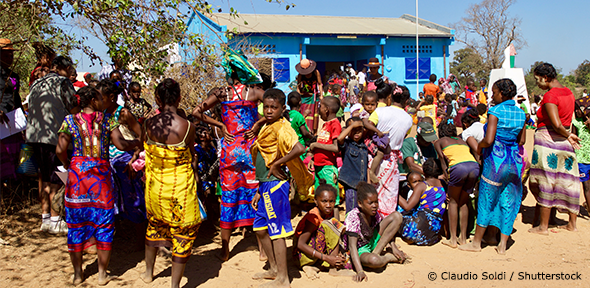
By Ngo Bibaa Lundi-Anne Omam
For several decades, malaria has caused the deaths of tens of millions of people especially in sub-Saharan Africa. It caused 229 million cases and 409,000 deaths globally in 2019. In fact, every 2 minutes, a child dies from malaria accounting for about 67% of all malaria deaths worldwide. Furthermore, about 70% of the world’s malaria burden is found in just 11 high-burden countries, with 10 of these countries being in sub-Saharan Africa. These high-burden countries accounts not only for an estimated 151 million cases of malaria and 275 000 deaths, but also for a significant economic cost. This in most case would imply small traders will close their business, children will miss school, farmers will stay off their farms and spend time going to clinics or hospitals. Simply put, households get impoverished while seeking care from malaria.
It is against this backdrop that the world pulled together efforts to fight malaria, leading to unprecedented scale-up of malaria interventions in the 21st century. It could be said that these efforts have paid off with the recent announcement by the World Health Organisation of the approval of a vaccine (RTS,S/AS01) against malaria. The recent approval of the RTS,S/AS01 malaria vaccines comes as a breakthrough to countries especially those with a high burden like in Sub-Saharan Africa.
Although this news brings hope for the eradication of malaria, it might meet with a growing hesitancy against vaccines. This calls for clear communication and strong community engagement strategies for communities to embrace the vaccine. It is thus important to be reminded why community-engagement is needed for a successful rollout and high uptake of the malaria RTS,S/AS01 vaccine; “lest we forget”.
Why a strong community engagement for the malaria RTS,S/AS01 vaccine is necessary
Debunking myths: With the rapid spread of rumours and a growing vaccine hesitancy community against vaccines, it is expedient that an early and strong community engagement process be activated within malaria high burden countries to debunk all potential rumours around the RTS,S/AS01 vaccine. Although the unmoderated used of social media has contributed largely to the spread of rumours, hate and stigma around vaccination programs, a strong engagement with community leaders, civil society activist and community health workers is capable of changing the negative narratives that surrounds vaccination. Civil society activists and community leaders are able to make use of communication media and platforms used by communities and speak in ‘languages’ best understood by their communities to encourage uptake of the malaria RTS,S/AS01 vaccine while promoting love and global solidarity.
Reducing health- related stigma: It is not uncommon to face health-related stigma as it has been a phenomenon which has plagued communities for centuries. In recent years especially with the coming of the COVID-19 pandemic, health-related stigma has been exacerbated especially against people who have being vaccinated or vaccinators. With stigma comes rejection and isolation from society which further encourages the spread of diseases. It is important to challenge the negative narratives around vaccination programs by co-creating messages and communication on the malaria RTS,S/AS01 vaccine with community leaders. With a strong community engagement plan, it is possible to counter the false information that maybe propagated on social media about the malaria vaccine.
Leverage existing community networks: With the presence of community health workers network, network of civil society organisations, network of traditional and religious leaders in every country, the process to activate a strong community response and uptake of the malaria RTS,S/AS01 vaccine becomes relatively easier. In the case of the malaria RTS,S/AS01 vaccine, is it necessary to leverage existing networks of community structures to ensure children in Sub-Saharan Africa especially those in hard-to-reach and underprivileged communities do not miss receiving the RTS,S/AS01 vaccine, leaving them vulnerable to malaria. Moreover, actively engaging community leaders, civil society and community health workers at this early stage ensures proper planning and targeting approaches to reach every child with the vaccine.
Overcoming cultural barriers: While the international community and countries rally efforts in rolling out the malaria RTS,S/AS01 vaccine, it is important for policies and strategies to recognise the role culture plays in controlling and managing communicable diseases. Under such circumstances, there are no better alternatives than engaging with community members and community leaders to better state what will work best in their context considering their cultural and traditional practices (5). Lessons could be drawn from the Ebola experience on how culture and tradition greatly affected the spread of the disease and impeded containment efforts like vaccination. If the roll out plans for the malaria RTS,S/AS01 vaccine are to succeed, we cannot forget or ignore the role communities have to play in vaccination programs.
Accessing conflict-affected communities: Conflict-affected communities present with huge challenges in accesses communities with health services. And these challenges will be true even for the malaria RTS,S/AS01 vaccine. In these settings, security constraints linked with kidnapping, forceful retention, gunshots impedes access to communities, thus necessitating a strong community engagement strategy that uses a humanitarian approach to allow vaccinators reach communities safely. Community leaders are very valuable in mediating and facilitating access for humanitarians to deliver services and would be important in supporting the roll out of the malaria RTS,S/AS01 vaccine in these settings. There is no better time to strongly engage and co-create with community leaders, civil society organisations and community health workers. A strong community engagement plan is key in this global roll out of the RTS,S/AS01 vaccine.


